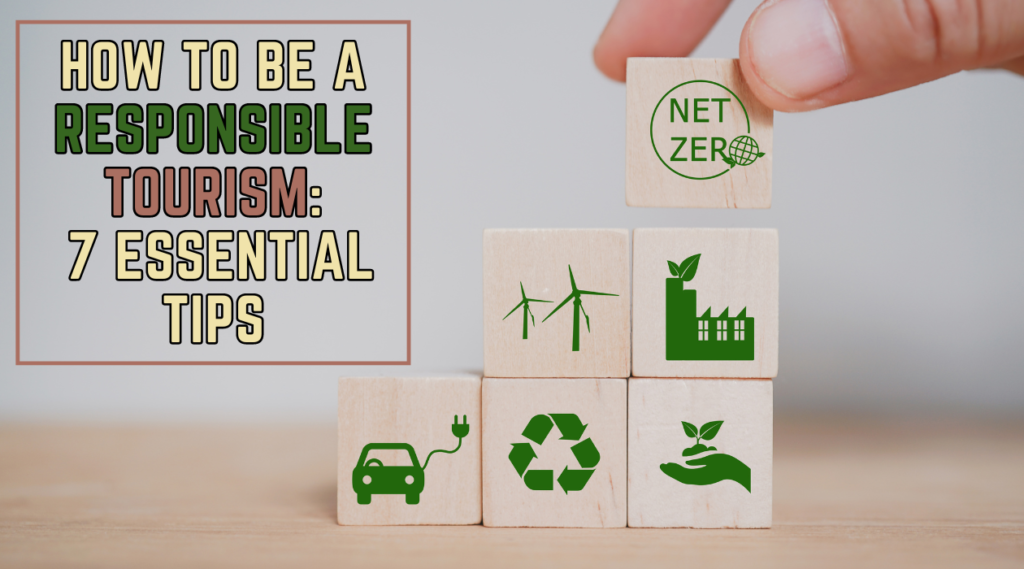As the world becomes increasingly interconnected, the allure of far-flung destinations and exotic cultures beckons travelers from all corners of the globe. But as we venture forth, it’s essential to remember that our footprints, both literal and figurative, can have a lasting impact on the places and communities we visit. Responsible travel is not just a moral obligation, but a necessity for preserving the beauty, diversity, and authenticity of our planet’s most precious travel destinations. By adopting a mindful and respectful approach to exploration, we can ensure that our wanderlust not only enriches our own lives, but also benefits the local economies, environments, and people we encounter. In this article, we’ll delve into the 7 essential tips for responsible travel, providing you with the knowledge and inspiration to wander wisely, leave a positive impact, and return home with a heart full of unforgettable memories and a conscience clear of guilt.
1. What is Responsible Tourism and Why Does it Matter?

As we set out to explore the world, it’s easy to get caught up in the excitement of discovering new destinations, immersing ourselves in foreign cultures, and collecting unforgettable memories. But have you ever stopped to think about the impact your travels have on the places and people you visit? Responsible Tourism is about more than just ticking off items on your bucket list – it’s about being mindful of the environment, respecting local communities, and contributing to the economies of the destinations you visit.
In an era where overtourism is putting pressure on fragile ecosystems, straining local resources, and disrupting traditional ways of life, Responsible Tourism has become more crucial than ever. The truth is, that our travel choices have real consequences, and it’s up to us to ensure that our wanderlust doesn’t come at the expense of the planet and its inhabitants. By adopting Responsible Tourism practices, we can not only minimize our negative impact but also enrich our own travel experiences, foster deeper connections with local communities, and help preserve the beauty and diversity of our world for future generations.
2. Tip 1: Research, Research, Research – Know Before You Go

Before you embark on your next adventure, it’s essential to do your homework. Researching your destination is crucial to being a responsible traveler. Knowing what to expect, understanding local customs, and respecting the environment and culture of the place you’re visiting can make all the difference.
Imagine showing up in a foreign country without a clue about the local dress code, only to unintentionally offend the locals with your attire. Or, picture yourself wandering through a protected national park, unaware of the fragile ecosystem and inadvertently causing harm to the environment. These scenarios can be easily avoided with a little research beforehand.
By doing your due diligence, you’ll not only avoid cultural faux pas and environmental mishaps, but you’ll also gain a deeper understanding and appreciation of the place you’re visiting. You’ll be able to navigate the local transportation system, try authentic cuisine, and support local businesses that align with your values.
So, take the time to read up on your destination, talk to fellow travelers, and consult with local experts. The more you know, the more you’ll be able to immerse yourself in the local culture and make a positive impact on the communities you visit.
3. Tip 2: Respect Local Cultures and Traditions
As you venture into unfamiliar territories, it’s essential to remember that you’re not just a tourist, but a guest in someone else’s home. Respect for local cultures and traditions is the hallmark of responsible travel, and it’s crucial to approach each new destination with sensitivity and awareness.
Imagine walking into a grand cathedral, only to find that your revealing outfit is deemed inappropriate. Or, picture yourself unintentionally offending a local by using your left hand to eat, unaware that it’s considered unclean in that culture. These avoidable faux pas can be detrimental to the local community and your own travel experience.
By taking the time to research and understand the local customs, you’ll not only avoid unintentionally offending the locals, but you’ll also gain a deeper appreciation for the place you’re visiting. Learn a few key phrases in the local language, such as greetings and expressions of gratitude, to show your respect and appreciation for the culture. Be mindful of dress codes, remove your shoes when required, and avoid public displays of affection in conservative cultures.
By embracing the local way of life, you’ll not only enrich your travel experience but also contribute to the preservation of the community’s heritage and traditions. Remember, responsible travel is not just about seeing the sights, but about immersing yourself in the local culture and making a positive impact on the places you visit.
4. Tip 3: Be Mindful of Your Environmental Footprint
As you embark on your travel adventure, it’s essential to remember that your actions can have a lasting impact on the environment and local ecosystems. With the growing concern of climate change, it’s more important than ever to be mindful of your environmental footprint. From the moment you step off the plane, every decision you make can either contribute to the problem or be part of the solution.
When exploring your destination, consider the mode of transportation you use. Instead of renting a car or taking taxis, opt for public transportation, walk, or bike whenever possible. Not only is this a more eco-friendly option, but it’s also a great way to immerse yourself in the local culture. Additionally, make a conscious effort to reduce your plastic usage by carrying a reusable water bottle and avoiding single-use plastics.
When choosing accommodations, look for hotels or resorts that have implemented sustainable practices, such as solar power, recycling programs, and energy-efficient lighting. By supporting these eco-friendly establishments, you’re encouraging the industry to adopt more responsible practices.
Remember, every small action counts, and collectively, we can make a significant difference. By being mindful of your environmental footprint, you’re not only helping to preserve the beauty of our planet, but you’re also setting a positive example for others to follow.
5. Tip 4: Support Local Economies and Communities

As you venture into unfamiliar territories, it’s essential to remember that your travel choices have a ripple effect on the local communities you visit. One of the most significant ways to make a positive impact is by supporting local economies and communities. By doing so, you’re not only injecting money into the local economy, but you’re also helping to preserve the cultural heritage and traditions of the places you visit.
This means opting for family-run accommodations, dining at local eateries, and shopping at markets or from small, independent vendors. These small actions can have a substantial impact on the lives of locals, providing them with a steady income and enabling them to maintain their way of life. Moreover, you’ll often find that these local businesses offer a more authentic and immersive experience, allowing you to truly connect with the culture and people of the place you’re visiting.
By supporting local economies, you’re also helping to reduce the reliance on multinational corporations and large hotel chains, which can often lead to the exploitation of local resources and the displacement of indigenous communities. So, take the time to research and seek out local businesses, and be mindful of the companies you’re supporting with your travel dollars. By doing so, you’ll be contributing to a more sustainable and responsible travel experience that benefits everyone involved.
6. Tip 5: Learn a Few Key Phrases in the Local Language

As you venture into unfamiliar territories, the language barrier can be a significant obstacle to overcome. But, with a little effort, you can break down this barrier and connect with the locals on a deeper level. Learning a few key phrases in the local language is a simple yet powerful way to show respect for the culture and people you’re visiting. It’s not about being fluent; it’s about making an effort to communicate and understand the nuances of the local way of life. Start with basic phrases like “hello,” “thank you,” “excuse me,” and “where is…”. These small phrases can go a long way in making your interactions more meaningful and enjoyable. Imagine being able to ask for directions, negotiate prices, or even order food in the local language – it’s a game-changer. Not only will you be able to navigate more easily, but you’ll also earn the respect and appreciation of the locals, who will be more likely to open up and share their stories, traditions, and hidden gems with you. By taking the time to learn a few key phrases, you’ll be able to immerse yourself more fully in the local culture and create unforgettable memories that will last a lifetime.
7. Tip 6: Be Prepared and Plan Ahead
The thrill of venturing into the unknown can be exhilarating, but it’s essential to temper that excitement with a dose of preparation and planning. Responsible travel is not just about being mindful of the local environment and culture, but also about being respectful of your own time and safety. Before you embark on your journey, take the time to research your destination, understand the local customs and laws, and plan your itinerary accordingly. This will not only help you avoid any potential pitfalls but also ensure that you make the most of your trip. From booking accommodations that adhere to sustainable tourism practices to packing essential items like sunscreen, insect repellent, and a portable charger, being prepared can make all the difference between a stressful and an enjoyable trip. Additionally, consider purchasing travel insurance that covers unexpected medical or travel-related expenses, and make digital copies of your important documents, such as your passport and travel itinerary. By planning, you’ll be able to focus on soaking up the sights and sounds of your destination, rather than worrying about the what-ifs.
8. Tip 7: Embrace the Unknown and Be Flexible
The art of embracing the unknown – a crucial aspect of responsible travel that can make all the difference between a memorable adventure and a frustrating experience. When we venture into unfamiliar territories, things don’t always go as planned. Flight delays lost luggage, and unexpected changes in weather or local events can quickly turn a well-laid plan into chaos. But it’s precisely in these moments of uncertainty that we’re allowed to practice flexibility and adaptability.
By embracing the unknown, we open ourselves up to new experiences, unexpected encounters, and a deeper understanding of the local culture. Perhaps a sudden rainstorm forces you to take shelter in a quaint local café, where you strike up a conversation with a friendly local who recommends a hidden gem of a hiking trail. Or, a canceled tour inspires you to explore a nearby market, where you stumble upon a vibrant street food scene that becomes the highlight of your trip.
By being flexible and rolling with the punches, you’ll not only reduce your stress levels but also increase your chances of having a truly authentic and unforgettable travel experience. So, take a deep breath, let go of your need for control, and remember that the best travel stories often arise from unexpected twists and turns.
9. The Impact of Irresponsible Travel on Local Communities
As we venture into the uncharted territories of our planet, it’s essential to acknowledge the profound impact our travels can have on the local communities we visit. Irresponsible travel can unleash a ripple effect of negative consequences, threatening the very fabric of these communities. The influx of tourists can lead to overcrowding, noise pollution, and strain on local resources, disrupting the delicate balance of daily life.
Furthermore, the demand for cheap accommodations and services can drive down wages, perpetuating exploitation and poverty among local workers. The cultural heritage of these communities can also be eroded, as traditional practices and customs are watered down to cater to the demands of tourists. The once-pristine environments can be ravaged by litter, pollution, and habitat destruction, leaving behind a trail of devastation.
We must recognize the potential harm our actions can cause and take steps to mitigate it. By adopting responsible travel practices, we can ensure that our presence in these communities is a positive one, contributing to their economic growth and cultural preservation. We owe it to ourselves, the locals, and the planet to wander wisely, leaving a gentle footprint on the destinations we visit.
10. How to Make a Positive Impact on the Places You Visit
As you wander through the streets of foreign lands, it’s essential to remember that your presence has a ripple effect on the local community and environment. Responsible travel is not just about being a thoughtful tourist, but also about being a conscious contributor to the destinations you visit. To make a positive impact, start by respecting local customs and traditions. Learn a few key phrases in the local language, such as greetings and thank-yous, to show your appreciation for the culture. Be mindful of your surroundings and avoid littering, as even the smallest actions can have a significant impact on the environment.
When it comes to supporting local businesses, opt for family-owned restaurants, shops, and accommodations instead of large chain hotels. Not only will you be injecting money directly into the local economy, but you’ll also be treated to authentic experiences that are often more memorable and meaningful. Additionally, consider visiting local markets and purchasing handmade crafts or souvenirs, which can help preserve traditional skills and provide a sustainable source of income for artisans.
By being intentional with your travel choices, you can help create a positive and lasting impact on the places you visit. Remember, responsible travel is not just about being a good guest, but also about being a thoughtful citizen of the world.
11. Conclusion: Wander Wisely and Make a Difference
As you embark on your next adventure, remember that the art of traveling responsibly is not just about ticking off a checklist of eco-friendly practices or cultural sensitivities. It’s about embracing a mindset that acknowledges the impact of your presence on the places and people you encounter. By incorporating these 7 essential tips into your travel routine, you’ll not only be minimizing your footprint but also enriching your experiences and fostering deeper connections with the communities you visit.
As you wander wisely, you’ll begin to notice the subtle yet profound differences you’re making. From the local vendor who benefits from your thoughtful purchases to the fragile ecosystem that’s preserved through your sustainable choices, every decision counts. And when you return home, you’ll carry with you a newfound appreciation for the world’s diversity and a sense of pride in knowing that your travels have contributed to the greater good.
So, go forth and explore the world with intention and respect. Let your travels be a force for positive change, and inspire others to do the same. For in the end, it’s not just about the places we visit, but about the people we meet, the lessons we learn, and the impact we leave behind.
What is responsible tourism?
Responsible tourism refers to traveling in a way that minimizes negative impacts on the environment, culture, and local communities while maximizing the benefits for all stakeholders involved. It involves being mindful of one’s actions as a traveler and making choices that contribute positively to the destinations visited.
How can I practice responsible tourism?
You can practice responsible tourism by doing research before your trip to understand the local culture and customs, respecting wildlife and natural habitats, minimizing your environmental footprint by reducing waste and conserving resources, supporting local businesses and communities, and engaging in activities that promote sustainability and conservation.
Why is responsible tourism important?
Responsible tourism is important because it helps preserve natural and cultural resources, supports local economies, and fosters mutual respect and understanding between travelers and host communities. It also ensures that future generations can continue to enjoy and benefit from the world’s diverse destinations.
What are some examples of responsible tourism initiatives?
Examples of responsible tourism initiatives include eco-friendly accommodations that prioritize sustainability and conservation, community-based tourism projects that empower local communities and preserve traditional ways of life, wildlife conservation programs that protect endangered species and their habitats, and responsible tour operators that prioritize ethical practices and sustainable tourism experiences.
How can I support responsible tourism?
You can support responsible tourism by choosing tour operators and accommodations that have a commitment to sustainability and responsible practices, minimizing your environmental impact by reducing waste and conserving resources during your travels, respecting local cultures and customs, and giving back to the communities you visit through responsible volunteering or donations to local charities and initiatives.
As you embark on your next adventure, remember that the journey of a thousand miles begins with a single step – and a responsible one at that. By incorporating these 7 essential tips into your travel routine, you’ll not only ensure a more authentic and enriching experience but also contribute to the preservation of our planet’s precious cultural and natural wonders. So, pack your bags, grab your passport, and wander wisely – the world is waiting for you!
——————————




Pingback: The 10 Most Visited Eco-Cities You Need to Explore -
Pingback: 10 Most Beautiful Sustainable Villages in Switzerland in 2024 -